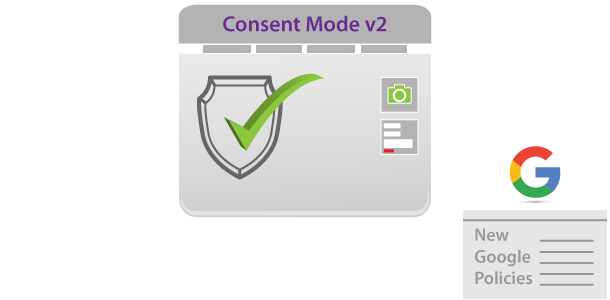Consent mode v2 is an updated version of consent mode that was released in November 2023. Consent Mode version 2 policy as of March 2024 now states that to use Google Products (e.g. Google Analytics, Google Tag Manager, Google Ads, AdSense or others) you must obtain consent before you can send data to Google.
Consent mode v2 tells website owners to inform website (or app, or any data you upload to Google) users about their choices and specifically get consent for storing information about their behavior on a website.
EU Consent Mode for receiving traffic from anyone in European Economic Area (EEA) (including UK) includes two new parameters in addition to ‘ad_storage’ and ‘analytics_storage’:
- ad_storage (granted | denied) this tag enables storage, such as cookies, related to advertising.
- ad_user_data (granted | denied) this tag sets consent for sending user data related to advertising to Google (default state in Consent mode v2 must now be set to denied, but granted only when user gives consent)
- ad_personalization (granted | denied) this tag sets consent for personalized advertising (default state in Consent mode v2 must now be set to denied, but granted only when user gives consent)
- analytics_storage (granted | denied) this tag enables storage, such as cookies, related to analytics (for example, visit duration).
- functionality_storage (granted | denied) this tag enables storage that supports the functionality of the website or app such as language settings.
- personalization_storage (granted | denied) this tag enables storage related to personalization such as video recommendations.
- security_storage (granted | denied) this tag enables storage related to security such as authentication functionality, fraud prevention, and other user protection
Video Tutorial Explains What Google Consent Mode v2 is
Frequently Asked Questions
Is Google Consent Mode v2 Mandatory and Legal from March 2024?
YES. Beginning from 16 January 2024 websites (or Apps) using Google services (Google AdSense, Ad Manager, or AdMob) must follow the updated consent guidelines when serving ads, particularly to users in the European Economic Area (EEA) and the UK in order to comply with updated policies.
As a part of Google’s ongoing commitment to a privacy-centric digital advertising ecosystem, in 2024, Google's enforcement action will also impact measurement features and apply to data from:
- Websites: Tags that send data to Google.
- Apps: SDKs that send data to Google.
- Data uploads: Tools to upload data from non-Google sources, such as offline conversion imports or store sales.
To keep using measurement, ad personalization, and remarketing features, you must collect consent for use of personal data from end users and then share thpse consent signals with Google. The requirements also apply to businesses using Google Analytics data with a Google service.
What Happens If I Do Not Update to Google Consent Mode v2?
When not adhering to Google policies and Terms of Use. Google may suspend or disable your use of Google products or services.
What are the Benefits of Using Consent Mode v2?
Privacy has always been important, just as you wouldn't want your neighbor to sneak up to your bedroom window for a peep. When you use Google products, the data sent to Google is used in various ways (for example: ad personalization and online tracking for remarketing).
Informing users are helpful as some users would not want their data collected for privacy reasons, this also ensures better transparency and user-experience.
What Does Google Consent Mode Do?
If website (or App) users do not specifically grant permission, then, tracking data is not sent to Google. Consent Mode v2 enforces this.
What is Google Consent Mode v2 for Australia?
All websites (or Apps) using Google products need to upgrade to consent mode v2 when serving Ads to users from European Economic Area (EEA). This includes Australian based businesses.
Note: local business's using Google Ads campaigns with location targeting set as "show ads to people in Australia only" can simply continue implementing Australian Privacy Principles. Although updating your privacy policy page (or notices) is encouraged.
For more information about the new Google consent policies visit the Consent Mode v2 category section.


